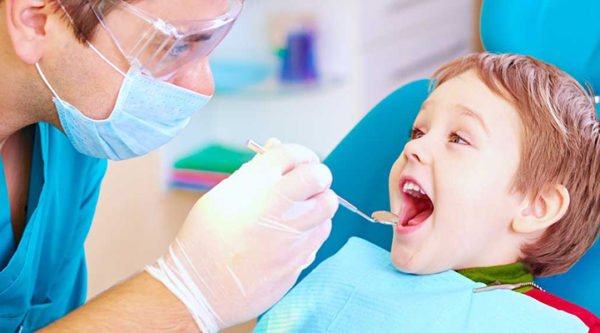Call Us Today! (403) 277-7464 NEW PATIENTS: (587) 317-9910 | 116-30 Springborough Blvd SW, CALGARY AB T3H 0N9

First Dental Visit for a Child

According to the American Academy of Pediatric Dentistry (AAPD) guidelines, infants should initially visit the pediatric dentist around the time of their first birthday. First visits can be stressful for parents, especially for parents who have dental phobias themselves It is imperative for parents to continually communicate positive messages about dental visits (especially the first one), and to help the child feel as happy as possible about visiting the dentist.
How can I prepare for my child’s first dental visit?
As said earlier, dentists are required to undergo extensive training in child psychology. Their dental offices are generally colorful, child-friendly, and boast a selection of games, toys, and educational tools. Pediatric dentists (and all dental staff) aim to make the child feel as welcome as possible during all visits.
There are several things parents can do to make the first visit enjoyable. Some helpful tips are listed below:
Take another adult along for the visit – Sometimes infants become fussy when having their mouths examined. Having another adult along to soothe the infant allows the parent to ask questions and to attend to any advice the dentist may have.
Leave other children at home – Other children can distract the parent and cause the infant to fuss. Leaving other children at home (when possible) makes the first visit less stressful for all concerned.
Avoid threatening language – Dentists and staff are trained to avoid the use of threatening language like “drills,” “needles,” “injections,” and “bleeding.” It is imperative for parents to use positive language when speaking about dental treatment with their child.
Provide positive explanations – It is important to explain the purposes of the dental visit in a positive way. Explaining that the dentist “helps keep teeth healthy” is far better than explaining that the dentist “is checking for tooth decay and might have to drill the tooth if decay is found.”
Explain what will happen – Anxiety can be vastly reduced if the child knows what to expect. Age-appropriate books about visiting the dentist can be very helpful in making the visit seem fun. Here is a list of parent and dentist-approved books:
- The Berenstain Bears Visit the Dentist – by Stan and Jan Berenstain.
- Show Me Your Smile: A Visit to the Dentist – Part of the “Dora the Explorer” Series.
- Going to the Dentist – by Anne Civardi.
- Elmo Visits the Dentist – Part of the “Sesame Street” Series.
What will happen during the first visit?
There are several goals for the first dental visit. First, the dentist and the child need to get properly acquainted. Second, the dentist needs to monitor tooth and jaw development to get an idea of the child’s overall health history. Third, the dentist needs to evaluate the health of the existing teeth and gums. Finally, the dentist aims to answer questions and advise parents on how to implement a good oral care regimen.
The following sequence of events is typical of an initial “well baby checkup”:
- Dental staff will greet the child and parents.
- The infant/family health history will be reviewed (this may include questionnaires).
- The pediatric dentist will address parental questions and concerns.
- More questions will be asked, generally pertaining to the child’s oral habits, pacifier use, general development, tooth alignment, tooth development, and diet.
- The dentist will provide advice on good oral care, how to prevent oral injury, fluoride intake, and sippy cup use.
- The infant’s teeth will be examined. Generally, the dentist and parent sit facing each other. The infant is positioned so that his or her head is cradled in the dentist’s lap. This position allows the infant to look at the parent during the examination.
- Good brushing and flossing demonstrations will be provided.
- The state of the child’s oral health will be described in detail, and specific recommendations will be made. Recommendations usually relate to oral habits, appropriate toothpastes, and toothbrushes for the child, orthodontically correct pacifiers, and diet.
- The dentist will detail which teeth may appear in the following months.
- The dentist will outline an appointment schedule and describe what will happen during the next appointment.
How Often Should Children Have Dental Checkups?
Questions or concerns about your child’s first dental visit? Please feel free to contact our office at (587) 317-9910.
Other Child-Related Pages:
Care for Your Child’s Teeth | Dental Emergencies | Does Your Child Grind His or Her Teeth at Night? | Eruption of Your Child’s Teeth | First Visit | How Often Should Children Have Dental Checkups? | Pacifiers and Thumb Sucking | Sedation Dentistry for Children | What’s the Best Toothpaste for My Child? | When Should Children Have Their First Dental Visit? | Why Are Primary Teeth Important?
Copyright 2025 Springbank Dental Centre & Dental Growth Strategies | All Rights Reserved | Powered by Dental Growth Strategies

